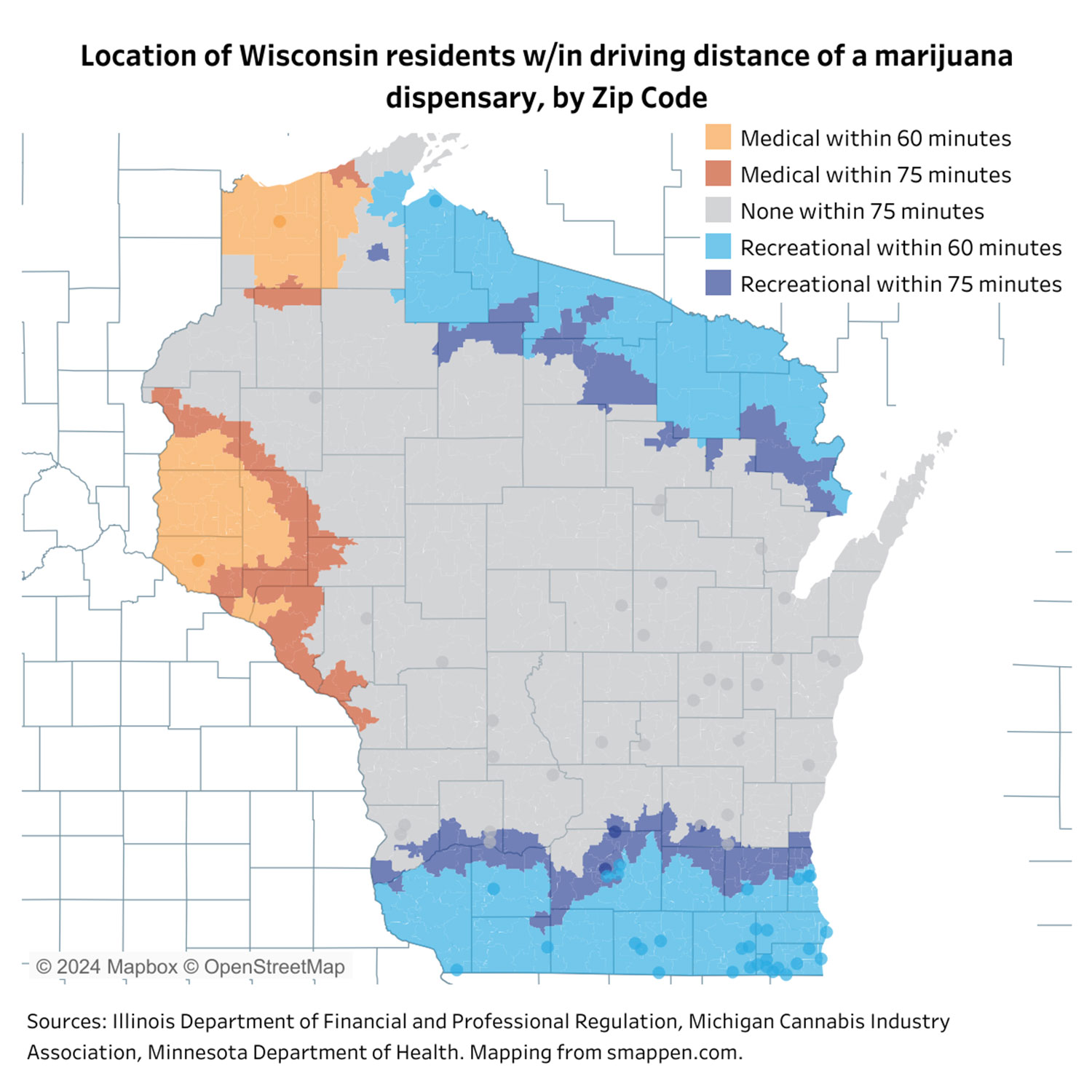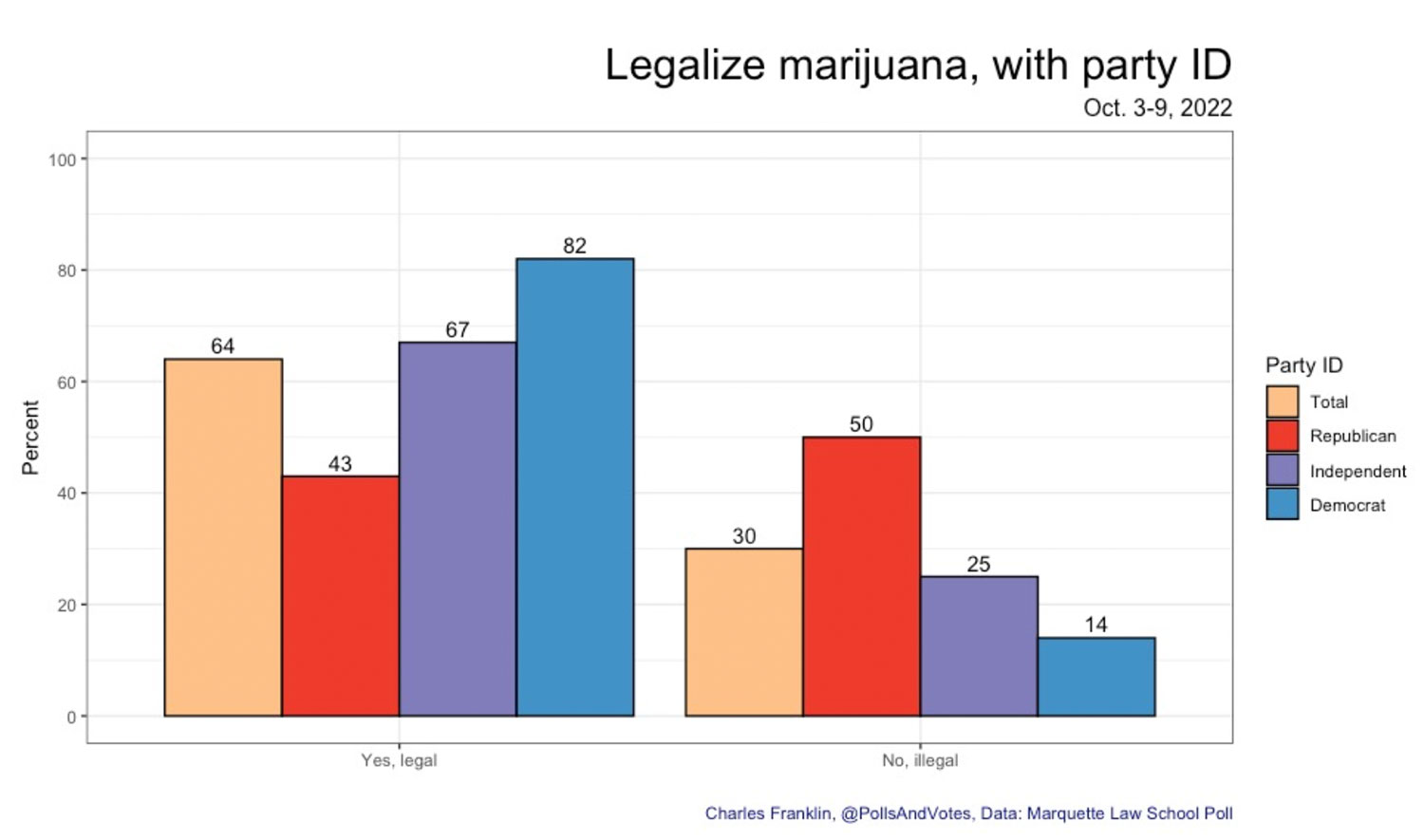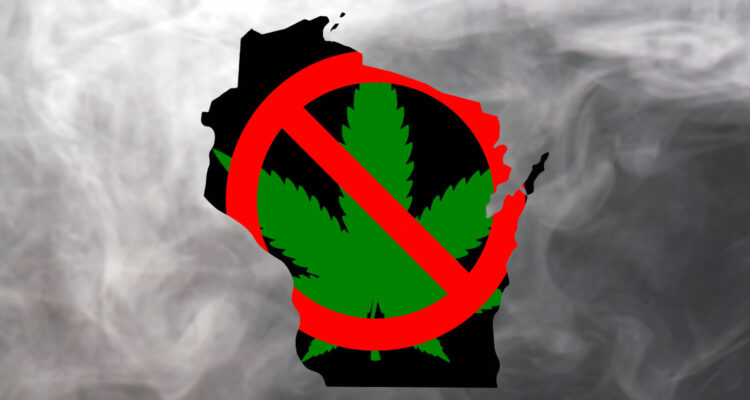Dan Shafer is the founder of The Recombobulation Area, an award-winning, reader-supported weekly column and online publication. Click HERE to subscribe.
A recent feature story from MLive in Michigan took an in-depth look at marijuana dispensaries along the Wisconsin-Michigan border. One of those Upper Peninsula stores shared a map of where their customers were coming from. It was quite revealing.
.@MLive has a really good new feature story on the marijuana shops in the UP along the Michigan-Wisconsin border, which includes this image of where one shop's customers are coming from. https://t.co/XOQ3cb8hfo pic.twitter.com/wNW3g3Ivqq
— Dan Shafer (@DanRShafer) December 6, 2023
Yes, it appears Wisconsinites are traveling to the Upper Peninsula in large numbers to purchase cannabis products. I’m sure this is shocking news to all of you.
Wisconsin’s approach to cannabis policy, in the year 2024, is baffling and incoherent. States across the country are realizing that marijuana prohibition is ineffective and unnecessary. More than half of all Americans, including most of our midwestern neighbors, now live in a state with legal recreational marijuana.
Beyond the tax revenue reasons, the criminal justice reasons, and simple common sense reasons—all of which favor legalization—there’s an issue of practicality and pragmatism now at play here. Wisconsin is nearly surrounded by states that have legalized marijuana, and clearly (as the MLive feature shows) Wisconsin’s policies are not stopping anyone from obtaining cannabis products at a legal dispensary. The arguments against legalization are ones that simply do not square with the reality of where the world is in 2024.
So, what the hell are we doing, Wisconsin?
At this point, Wisconsin’s inability to change with the times on this issue is just getting silly. Our policies aren’t really preventing anyone from purchasing cannabis products; people are just going to other states (or purchasing them illegally). Many municipalities, including Milwaukee, have decriminalized marijuana possession to where it is merely a small (to nonexistent) fine. Stores all over the state are legally offering CBD and various delta products and other marijuana-adjacent hemp-derived variations. Wisconsin’s Legislative Fiscal Bureau estimates that one year of legalization would generate nearly $170 million in tax revenue. The Wisconsin Policy Forum’s nonpartisan research showed that the majority of Wisconsinites live within a 75-minute drive from a legal dispensary—and that was before Minnesota passed recreational legalization last year.
It seems like we’re going out of our way to do everything but the main thing that makes the most sense: recreational legalization.

The Midwest, in recent years, has experienced a sea change on cannabis policy. Since 2018, recreational marijuana has been legalized in Michigan, Illinois, Missouri, Minnesota, and Ohio. Since 2016, medical marijuana has been legalized in North Dakota, South Dakota, and Iowa. The only holdouts in the region have been Indiana and Wisconsin. Wisconsin is also one of just 12 U.S. states without a “comprehensive medical cannabis program,” according to research from Ari Brown of the Wisconsin Policy Forum. Few states have taken less action on this issue than Wisconsin.
That seems to be changing. Well, somewhat.
Democrats in Wisconsin have proposed legalization efforts for medical or recreational marijuana many, many times. Gov. Evers has included legalization in each of his budget proposals since he was elected in 2018.
Many of the states that have passed legalization efforts have done so by statewide referendum—Ohio, most recently, after a successful statewide ballot measure where voters were 57% in favor of legalization—but state law in Wisconsin does not currently allow for such a vote. So, the only viable route for legalization to pass is through the Republican-controlled Wisconsin State Legislature.
State Sen. Melissa Agard, the Democratic Minority Leader from Madison, has been proposing legalization measures for more than a decade, but the Republicans running the legislature have continually denied a public hearing for such bills. Last year, Agard led a tour to promote legalization—the “Grass Routes” tour—making several stops around the state.
“What I saw [on that tour], regardless of if I was in a big city or a village or a town without a stop sign, meeting with business owners and concerned folks, is that people here are ready,” she said. “It is a really broad and diverse coalition of folks that are excited for [legalization] and frustrated by the fact that we haven’t crossed the finish line yet here in Wisconsin…People are ready for it. And it’s past time for Wisconsin to get on board.”
On Monday, January 8, Assembly Republicans did put forth a proposal on marijuana legalization. But not recreational. Only medical. And as far as medical legalization policies go, Assembly Speaker Robin Vos characterized it as “the most restrictive version in the entire country,” in an interview on UpFront.
NEW: Assembly GOP set to unveil their medical marijuana bill Monday
Today Speaker Vos said it will "probably be the most restrictive version in the entire country" adding if Gov. Evers continues talking about full legalizing it will "kill the bill"
THE INTERVIEW SUN ON UPFRONT pic.twitter.com/lkW76zRpEO
— Matt Smith (@mattsmith_news) January 5, 2024
The proposal would create five state-run dispensaries—yes, state-run dispensaries—managed by the state Department of Health Services, the first time in the U.S. such a program would be run by a state government. The program would be limited to only a select few medical conditions, and would be available in only certain forms —smokeable cannabis would not be available at all. The party of free enterprise and limited government, folks!
NOW: Assembly Republicans unveil their medical marijuana bill in South Milwaukee. pic.twitter.com/BDK1lRX8lD
— Emilee Fannon (@Emilee_Fannon) January 8, 2024
This is a proposal that seems dated even by standards of a decade ago, and a key Senate Republican has already expressed concerns with the bill. Still, it’s something the governor might end up signing if it were to pass, as he said in interviews last week. That might be the best we can get at the moment, given the current makeup of the Republican-controlled Wisconsin State Legislature.
Agard—who said she was not contacted as this bill was being crafted, despite her longtime action on this issue—said it comes back to Republican legislative leadership on this issue, and not necessarily the full Republican caucus.
“Our biggest challenge to having full legalization in the state of Wisconsin is Assembly Speaker (Robin) Vos and Majority Leader (Devin) LeMahieu,” she said.
Beyond Vos and LeMahieu, she said, she gets the sense that many Republicans in the state legislature would support recreational legalization.
“Many of my colleagues on the other side of the aisle have said, ‘you get it to the floor, I’ll vote with you,'” she said. “It is clear that there are Republicans in both the Assembly and the Senate that would vote for [recreational legalization]. And I think, if we got to the point where in the legislature, it was a majority vote—as opposed to everyone in a caucus behind closed doors deciding whether or not we’re moving forward with this—I do believe we’d have a majority of support through both houses.”
The most recent polling from the Marquette University Law School Poll shows that about two-thirds of Wisconsinites support recreational legalization. Even Republicans are split almost evenly on the issue.

So, is there anything beyond the typical opposition that comes from Republican leadership on any issue that Democrats favor that might be driving policy here?
Bring up the issue of marijuana legalization anywhere on social media and someone will invariably respond with criticism of a certain organization: the Tavern League of Wisconsin. So, I reached out to the Tavern League to see where they stood on this issue. Turns out they are not opposed to recreational marijuana legalization efforts. I repeat: The Tavern League of Wisconsin is not opposed to recreational marijuana legalization in this state, their spokesperson said.
“This is an issue that we have no dog in the fight whatsoever,” said Scott Stenger, spokesperson and government relations for the Tavern League of Wisconsin. “It’s not an issue for us.”
Asked why so many seem to point to the Tavern League as a reason marijuana has not been legalized in Wisconsin, Stenger said he has “no earthly idea.”
“Maybe it’s an easy way to explain the lack of movement [on the issue],” he said, “but I have no idea.”
The Tavern League has not taken an official position on this matter. In Wisconsin, if an organization is lobbying on a bill in the state legislature, they must register their position with the Wisconsin Ethics Commission. You can see the full list of the Tavern League’s lobbying efforts for the current session HERE. There are no marijuana-related bills it has registered in support of or in opposition to. On the most recent legalization bill proposed by Agard, three organizations have registered as lobbyists, all in favor (ACLU of Wisconsin, Wisconsin State AFL-CIO, Wisconsin Voices).
“We aren’t engaging in any effort to make those products legal, or are opposed to [making] those products legal,” said Stenger. “It’s not an issue for us. I think it’s a leap to make it an issue for taverns in the state.”
He said that they are more focused on other issues, like worker shortages. Even if something was made available through legalization that could hypothetically be sold in bars—like cannabis-infused beverages—it wouldn’t be a major issue for them either, Stenger said.
“There are all kinds of products in bars today that ten years ago didn’t exist,” he said. “We respond to that based on what our customers are telling us…If it’s something our customers want, we would try to respond to that.”
So, the Tavern League is not opposed to recreational legalization. The governor is not opposed to recreational legalization. Democrats in the state legislature are not opposed to recreational legalization. The vast majority of Wisconsin voters are not opposed to recreational legalization. Close to half of Republicans, even, are not opposed to recreational legalization.
So really, the only remaining holdouts to Wisconsin joining its Midwestern neighbors as a state where recreational marijuana is legal are Robin Vos, Devin LaMahieu, and legislative Republicans. There are also the Uihleins, the biggest Republican political donors in Wisconsin, who have funded opposition to legalization efforts across the country. Overall though, this is clearly an instance where the minority is dictating policy to the majority in Wisconsin.
So, it does seem as if legalization is inevitable. But when could it happen in Wisconsin?
“I’m going to be optimistic and say that, my hope is that in the next one of two legislative sessions—so, two to four years—that we’ll have legal cannabis,” said Agard.
This year’s election could be shaping up to be quite the unique one for the Wisconsin State Legislature, with the distinct possibility of state legislative elections happening under new maps after the Wisconsin Supreme Court ruled them unconstitutional in late December.
The marijuana legalization issue is clearly a loser for Republicans, and this latest proposal seems like a half-measure (at best) in effort to fend off campaign trail challenges. While Republicans would probably still be favored to win a majority under a new map, there would likely be far more competitive elections, especially in places like the Milwaukee area suburbs that have been heavily gerrymandered to tilt districts toward GOP control.
“My hope is that we have more fair and balanced legislative representation in the Capitol building, as we move forward because of the decision by the Wisconsin Supreme Court,” said Agard. “I think there is a laundry list of issues, of which cannabis policy is one, that will be able to be addressed when we have a more fair and balanced legislature. Again, having nearly 70% of the folks in Wisconsin supporting full legalization and over 80% of the folks in Wisconsin supporting thoughtful medicinal policy. This is the will of the people and that should be the law of the land.”
If only it were that simple. This is a policy that should easily (puff, puff) pass.
Want more Milwaukee Record? Subscribe to our free weekly newsletter and/or support us on Patreon.
RELATED ARTICLES
• “Legalize MKE” aims to answer questions about marijuana possession in Milwaukee County
• County Board adopts resolution reducing marijuana possession penalty

